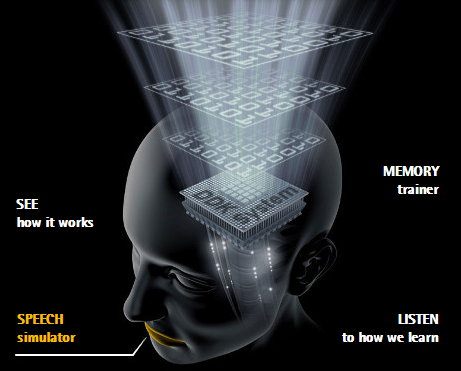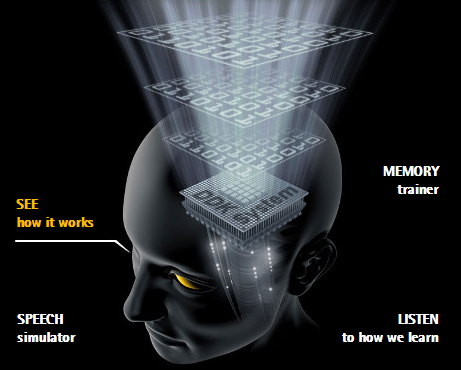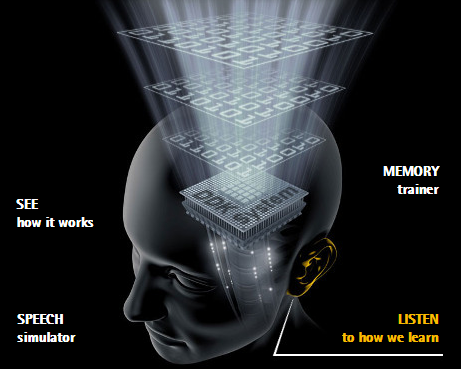Projects
DDK System
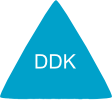
Thanks to the technology DDK ® System (Dynamic Development of Knowledge), bai&by uses a highly sophisticated instructor or memory trainer for learning languages, being the only intelligent system in the market so far. This Technology is the result of 20 years research in the Artificial Intelligence field with an investment of over 6 million euro in R&D&I.
Beneath the failure in the learning of second languages, there is the lack of base and the use of inadequate learning strategies. The DDK® System has been designed to overcome both problems. Here we have its characteristics:
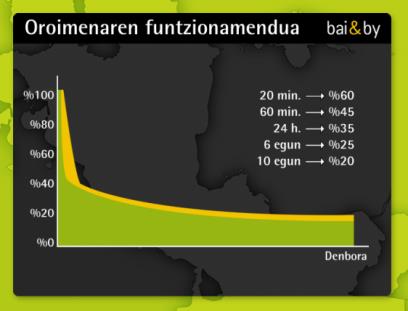
- Diagnosis capacity: it detects the characteristics of each student through the use of statistical analysis (short and long-term memory curve, assimilation capacity, changes in performance, errors…) and it elaborates a detailed student’s profile.
- Design strategies: based on this diagnosis, the system designs a totally personalized learning strategy and, in order to improve each student’s results, decides at every moment, what, how and when to study. Besides it designs the spaced repetition of the contents to guarantee its best assimilation.
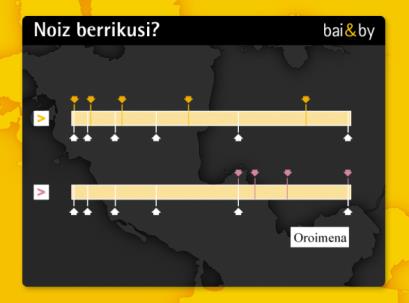
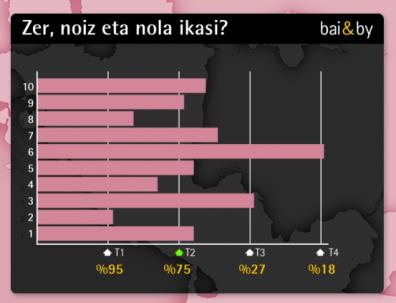
- Dynamic control: The DDK ® System controls the dynamics of the study sessions and alternates didactic games and various exercises to keep the student hyperactive and to get both cerebral hemispheres activated. This way, tiredness is reduced and performance improves turning the learning of the language into an easy and fun activity.
Thanks to this technology, the results are much better than those of the traditional methods or the on-line multimedia systems.
c-Extractor

The c-Extractor project has gone a step beyond with the development of an Intelligent Virtual Tutor. The project consists in the development of an automated Knowledge Extraction System derived from the highly structured information sources that form the expert DDK system database. The Intelligent System function is to simulate the human tutor producing such reports automatically and personalising them with graphics, assessments and learning advice in a natural and sophisticated way so that the recipient does not differentiate between the automatically produced report done by the intelligent system and the one produced by the human tutor. To meet this objective, the most updated technology has been used and, particularly, Artificial Intelligence techniques for the natural language processing (NLP).
e-Agents

The e-Agents project developed an Intelligent Virtual e-learning Environment based on Collaborative Pedagogical Agents.The most innovative and outstanding technological component of the project consists in an Intelligent Virtual Environment provided with an engine based on collaborative and adaptive Pedagogical Virtual Agents. To do that, some advanced Artificial Intelligence techniques have been used. In that way, the most sophisticated speaking simulator in the market has been developed, an e-learning system that improves the Intelligent Virtual Teacher through a cloister of Virtual Agents in collaboration: the Activities Generating Agent, the Instruction Agent, the Diagnostic Agent, the Dynamic Agent, the Motivating Agent, the Predictor Agent, and the Knowledge-Based Topographer.
LangMind

LangMind project is aimed at the creation of a linguistic technology so that the learning process is more dynamic and efficient. In this project, some technologies are used among others: Artificial Intelligence, Neurolinguistics, linguistic labelling, LipSync, 3D avatars. This project is the result of the work jointly carried out by two technological centres such as the BCBL (Basque Center on Cognition, Brain and Language) and Elhuyar.
To achieve this project the intelligent DDK system creates a linguistic map of knowledge that, apart from assessing the personal assimilation (punctuation, assimilation, automatization, accuracy..), it also joins them to each student’s knowledge to create his capacity map. In such a way, the new linguistic DDK System is able – before setting a diagnosis – to assess the student assimilation capacity as reference making use of the interiorization of the main learning points in the new contents. In this way, the repetition process gradually decreases, obtaining a more dynamic learning as it reduces the learning process duration.
2026 © DIDAKTIKER S.A. Promoting didactics and research from 1991.
Cookies policy | Legal notice | Hazitek DDKN
